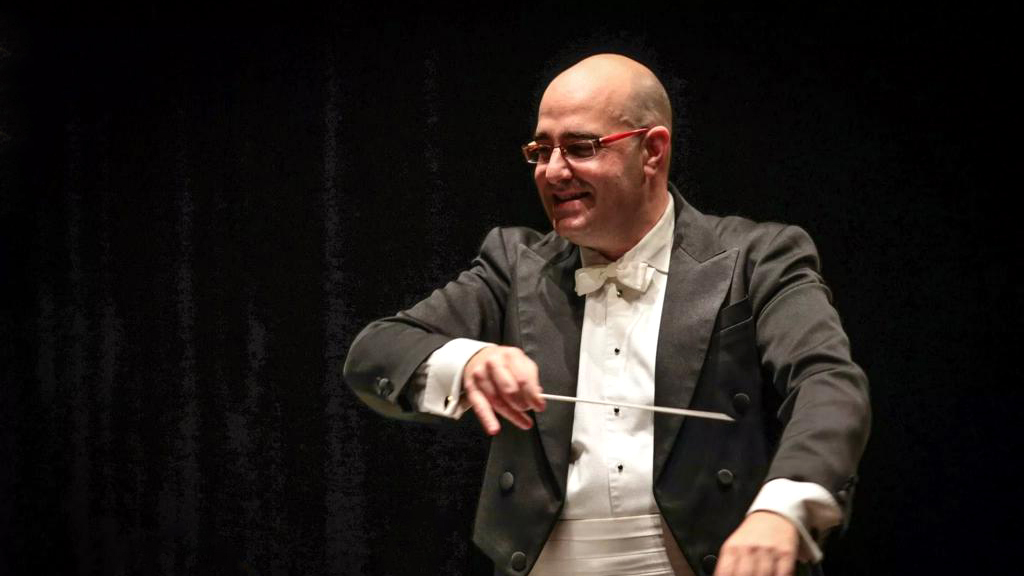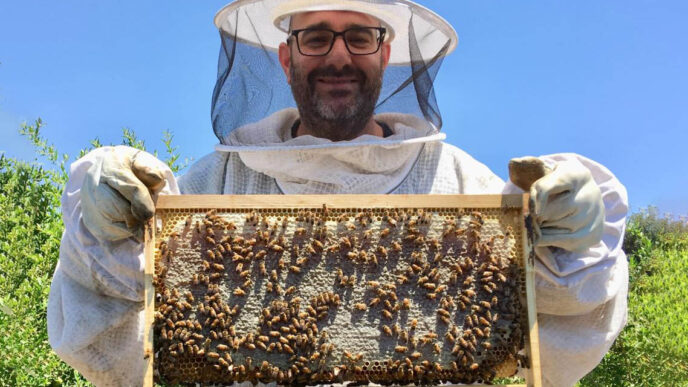
After an absence of many long months, theater and live performance have been permitted to open, returning orchestra conductor and Rehovot-native Yishai Shtekler (48) to the stage. Davar sat down with Shtekler to hear more about his experiences, both as a conductor and as a new recruit into the world of beekeeping and honey production.
What it is like to be a conductor?
“People ask: ‘If the whole orchestra knows the notes, what is the need for a conductor?' I respond: If all the actors know how to act [on their own], what is the need for a director? And if all the players know how to play soccer, what is the need for a coach? Conducting is basically like being a coach for an orchestra. With conducting, there are the technical aspects, that every musician starts and finishes at the same time, that they play at the same tempo. And then there is the element of interpretation.
"You are taking a group of 60 to 100 people, or in the case of an opera 200 to 300 people, and need to convince them that your interpretation of music is the right thing to do. It takes a lot of knowledge and charisma to get them there, ensuring that the whole experience will have meaning.
"In conducting, there are common agreed upon movements all over the world, like the movement of the stick in conducting on 4/4 time, or 3/4 time; and there are movements that are the personal language of each conductor. The movements give weight, rhythm, beginnings and endings, and tempo changes during the piece. But every conductor has their own unique body language, and their personality is personified through their movements, through which they can express their musical ideas.
"That is the beauty of this profession, the uniqueness of every conductor and the alchemical elements it brings to the orchestra. I am, for example, a very passionate conductor – I love to make everything over-the-top, with very cutting and rhythmic movements, as befits the world of opera with which I grew up. In Italian they call it appassionato, passionate."
How long have you been conducting?
“I have been conducting for twenty-one years; I studied conducting at the Royal College of Music in London, and since then I have been conducting, mainly for opera orchestras in Israel and around the world. In the last couple of weeks, I have returned to work but only part-time, doing rehearsals, small productions and the like.
"Being a conductor is like in opera, a bit tragic and a bit funny. When you stand in the orchestra's pit under the stage, you see the stage but the musicians do not see it. You're basically the connector, you tell the orchestra what is going on. If a singer accidentally stumbles on a word or a bar, you sometimes find yourself trying to gesture to the orchestra or even yelling, telling them to ‘skip it!’
"Conducting, of course, is mixed in with my personal life. For example, when my wife – herself a clarinet player in the orchestra – gave birth to our first child, the opera director called me while I was in the delivery room and told me that she had to conduct the orchestra because there was no one to replace me. I kissed my wife and ran to the opera hall, and that evening I conducted with energy from the delivery room, phone in hand, while receiving updates every second from the hospital. And since my wife plays in the orchestra and the other musicians are her friends, I also had to update them during the performance on her situation. As soon as the bowing/curtsying ended, I ran on foot to Ichilov Hospital, and made it just in time for the birth of my son while still wearing the suit. It was a good opera drama."
What did you miss most in your absence?
"I miss the audience the most. In recent months, I have conducted and worked a bit with the orchestra in filmed performances, but the interaction with the audience is very much lacking. From the pandemic I learned that there is no substitute for human contact. And more than that, there is no substitute for the stage. I've been faking it for a year, as if I'm excited about cameras, but it is not the truth.
"There is a beautiful sentence by the pianist Arthur Rubinstein, who said that he could sit in a hotel room and play piano, but as soon as the bellboy came in with the suitcases he would play completely differently. Music is a gift I feel I should give to someone, and a microphone is still not quite someone.”
How have you been occupying yourself without conducting?
"Three years ago, I took a beekeeping course and started volunteering at Magen Bee Adom [a play on Magen David Adom]. We go to people's homes to save and rescue beehives. Otherwise they would be exterminated. I bought some beehives myself and I would distribute the honey to family and friends. I also set up an educational beehive at an agricultural school in Modi’in.

"When the pandemic broke out, spring had just started, and there was a lot of honey. With the closure of everyday-life we found ourselves without income. We are two musician parents with three children. The hobby became a small business and I started selling honey. People loved it, and today I have to apologize to people when I have no honey left, but here spring has started again and soon there will be. Myhobby became a small business and I started selling honey. People were ecstatic about it, and today I have to apologize to people when I no longer have any honey left.”
How do conducting and beekeeping compare?
"As a conductor, you work with thousands of people in the hall, and as a beekeeper, it's just you, the bees and the seasons. For me, it balances things. But there is also a similarity between being a conductor and a beekeeper. When I am told that I produce the honey, I correct them and say that it is the bees that produce it. I only give them the best ecosystem I can, so that they can produce the most fantastic honey. But I do not produce honey.
"Being a conductor is the exact same thing. I'm the only person on stage who does not produce any sound. I do not play, I do not sing, I just make strange movements with my hands and come home with cramped muscles. All the sounds are made by the musicians and singers. As a conductor, I get the credit for being able to create this ecosystem; I get all the musicians and also all the bees to express themselves in the best way, and achieve the best result.
I owe a big thanks to the bees, because more than me saving bees, the bees save me. Because of the bees, I realized that we are social beings, and we cannot pretend that we get along without others, because we are dying from it."






